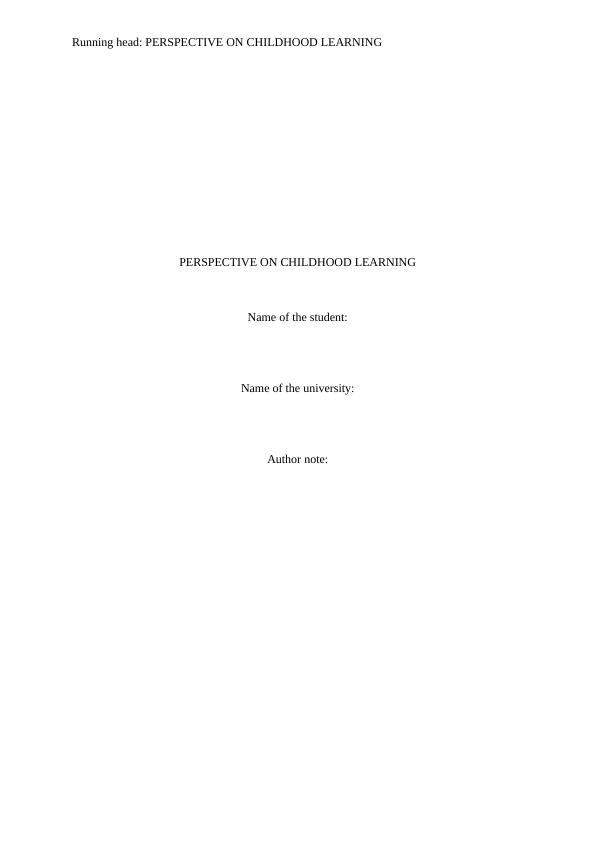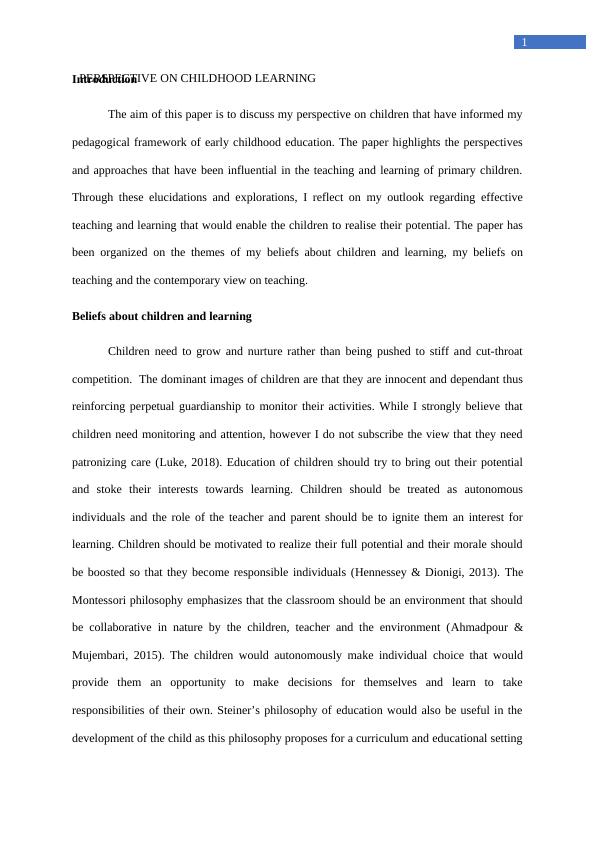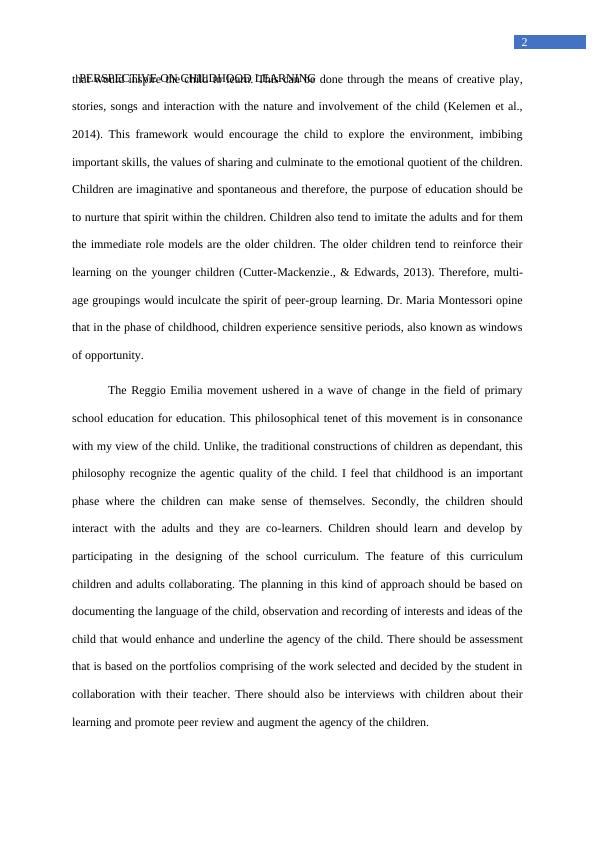Children's Learning Perspectives
8 Pages2239 Words91 Views
Added on 2021-04-24
Children's Learning Perspectives
Added on 2021-04-24
ShareRelated Documents
Running head: PERSPECTIVE ON CHILDHOOD LEARNINGPERSPECTIVE ON CHILDHOOD LEARNINGName of the student:Name of the university:Author note:

1PERSPECTIVE ON CHILDHOOD LEARNINGIntroduction The aim of this paper is to discuss my perspective on children that have informed mypedagogical framework of early childhood education. The paper highlights the perspectivesand approaches that have been influential in the teaching and learning of primary children.Through these elucidations and explorations, I reflect on my outlook regarding effectiveteaching and learning that would enable the children to realise their potential. The paper hasbeen organized on the themes of my beliefs about children and learning, my beliefs onteaching and the contemporary view on teaching.Beliefs about children and learningChildren need to grow and nurture rather than being pushed to stiff and cut-throatcompetition. The dominant images of children are that they are innocent and dependant thusreinforcing perpetual guardianship to monitor their activities. While I strongly believe thatchildren need monitoring and attention, however I do not subscribe the view that they needpatronizing care (Luke, 2018). Education of children should try to bring out their potentialand stoke their interests towards learning. Children should be treated as autonomousindividuals and the role of the teacher and parent should be to ignite them an interest forlearning. Children should be motivated to realize their full potential and their morale shouldbe boosted so that they become responsible individuals (Hennessey & Dionigi, 2013). TheMontessori philosophy emphasizes that the classroom should be an environment that shouldbe collaborative in nature by the children, teacher and the environment (Ahmadpour &Mujembari, 2015). The children would autonomously make individual choice that wouldprovide them an opportunity to make decisions for themselves and learn to takeresponsibilities of their own. Steiner’s philosophy of education would also be useful in thedevelopment of the child as this philosophy proposes for a curriculum and educational setting

2PERSPECTIVE ON CHILDHOOD LEARNINGthat would inspire the child to learn. This can be done through the means of creative play,stories, songs and interaction with the nature and involvement of the child (Kelemen et al.,2014). This framework would encourage the child to explore the environment, imbibingimportant skills, the values of sharing and culminate to the emotional quotient of the children.Children are imaginative and spontaneous and therefore, the purpose of education should beto nurture that spirit within the children. Children also tend to imitate the adults and for themthe immediate role models are the older children. The older children tend to reinforce theirlearning on the younger children (Cutter-Mackenzie., & Edwards, 2013). Therefore, multi-age groupings would inculcate the spirit of peer-group learning. Dr. Maria Montessori opinethat in the phase of childhood, children experience sensitive periods, also known as windowsof opportunity. The Reggio Emilia movement ushered in a wave of change in the field of primaryschool education for education. This philosophical tenet of this movement is in consonancewith my view of the child. Unlike, the traditional constructions of children as dependant, thisphilosophy recognize the agentic quality of the child. I feel that childhood is an importantphase where the children can make sense of themselves. Secondly, the children shouldinteract with the adults and they are co-learners. Children should learn and develop byparticipating in the designing of the school curriculum. The feature of this curriculumchildren and adults collaborating. The planning in this kind of approach should be based ondocumenting the language of the child, observation and recording of interests and ideas of thechild that would enhance and underline the agency of the child. There should be assessmentthat is based on the portfolios comprising of the work selected and decided by the student incollaboration with their teacher. There should also be interviews with children about theirlearning and promote peer review and augment the agency of the children.

End of preview
Want to access all the pages? Upload your documents or become a member.
Related Documents
Career Development And Systems Theory - PDFlg...
|8
|2101
|77
Personal Teaching Philosophy Assignment Reportlg...
|5
|1269
|35
Early Education and Carelg...
|15
|2943
|478
Personal Teaching Philosophy Assignmentlg...
|7
|1531
|89
(Doc) Montessori education: a review of the evidence baselg...
|10
|2781
|247
Early Childhood Education Assignment (Doc)lg...
|10
|2814
|378
